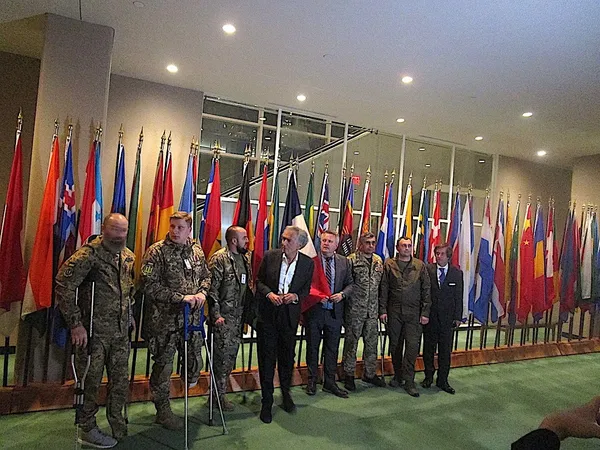In the second instalment with Bernard-Henri Lévy we discuss war films, including Rémy Ourdan’s The Siege, André Malraux’s Espoir: Sierra de Teruel, and Terre d’Espagne by Joris Ivens; Chernobyl, quoting a line by Emmanuelle Riva in Alain Resnais’s Hiroshima Mon Amour, screenplay by Marguerite Duras, and chapters five, nine, and twelve of Slava Ukraini, co-directed with Marc Roussel (produced by François Margolin with associate producer Emily Hamilton and advisor Gilles Hertzog).
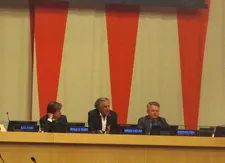 |
| Bernard-Henri Lévy with Nicolas de Rivière and Sergiy Kyslytsya at the United Nations Photo: Anne-Katrin Titze |
At the United Nations in New York inside the EOCSOC Chamber on the evening of May 4, Nicolas de Rivière, Ambassador and Permanent Representative of France to the United Nations, delivered the opening remarks and introduced Bernard-Henri Lévy. Following the screening of Slava Ukraini, Sergiy Kyslytsya, Ambassador Extraordinary and Plenipotentiary of Ukraine and Permanent Representative of Ukraine to the United Nations, joined Bernard-Henri Lévy and Nicolas de Rivière for a discussion of the critical front line documentary and where we are in Ukraine today.
In his opening remarks Lévy said: “This war is not only a war against Ukraine, it is not only a war against the west, it is a war against international community as itself. That’s why it is so important for me that this film can be shown tonight in this place which embodies, or tries to embody, the values of the international community.”
“I would like to thank, of course, all the team who did the film with me. My cameraman, my producer who is not here tonight, François Margolin, who is in France. I want to thank Charles Cohen [Cohen Media Group and the Quad Cinema in New York], who will start tomorrow to release the film all around the country, around America. I want to thank the diplomats, the ambassadors or their staffers, their deputies who are here in this room. I want to thank the friends who came also to support the cause of Ukraine. And I want to thank the Ukrainian cities and the soldiers who came here from Kyiv to be present tonight especially.”
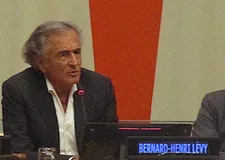 |
| Bernard-Henri Lévy presenting Slava Ukraini at the United Nations Photo: Anne-Katrin Titze |
The Ukrainian soldiers wounded in the war who were in attendance received a standing ovation from the packed room. After the screening of Slava Ukraini, the Ukrainian UN Ambassador invited the guests to react and comment on the film first.
Bernard, again so graciously began to respond by thanking his “real small team”, including co-director Marc Roussel, and Emily Hamilton, the co-producer of the film, who was hands-on that evening to make everything run smoothly and was in Lévy’s words the “guardian angel of this film and made it possible from the beginning to the end.”
“It is a war that threatens the whole world, not only the civilised world with nuclear blackmail, alimentation- and food blackmail.” Lévy continued “We are facing a war, if we don’t stop it as soon as possible, that would have consequences none of the wars I knew in the last decades could have. It is unprecedented in this regard.”
“I wanted to show the film in this place for it is time. It is time to stop. It’s time to help the Ukrainians stop this war.” Sergiy Kyslytsya predicted that the film’s real power is still to come, that “ten years from now, when Ukraine will have been rebuilt and Ukraine will have joined the European Union, this movie will be capital to preserve the memory.”
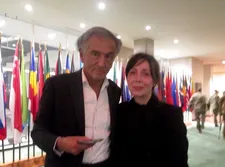 |
| Bernard-Henri Lévy with Anne-Katrin Titze at the United Nations Photo: Emily Hamilton |
From not in Paris, Bernard-Henri Lévy joined me on Zoom for an in-depth conversation on Slava Ukraini and where we are today a year later.
Anne-Katrin Titze: I want to talk about Chernobyl. You quote Emmanuelle Riva via Alain Resnais via Marguerite Duras [paraphrasing a line from Hiroshima, Mon Amour]: “As in Hiroshima, we saw nothing in Chernobyl.”
Bernard-Henri Lévy: The thing you have to see in Chernobyl is that the end of the world is possible. That human kind can be destroyed. This is what you feel in Chernobyl. Number one. And number two, this is what Putin threatens us about. It’s exactly the fear he tries to inject in our minds.
Probably, by the way, the only thing he succeeded to achieve. He lost most of his battles except maybe this one. But this, what I’m telling you, the possibility of the end of the world, you feel it, you don’t see it. You don’t see that. I did try in this chapter of the film to show what I did not see but what I felt. To show what I felt without seeing it.
AKT: There is the seeing again. In our conversation on The Will to See, we spoke about looking and seeing. Were there things you discovered during your journey, things you did see and decided not to include in the film? Because you felt you cannot show this?
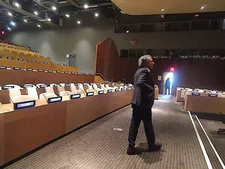 |
| Bernard-Henri Lévy before the Slava Ukraini screening at the United Nations Photo: Anne-Katrin Titze |
BHL: Bucha. There was a previous version of the movie where there were more faces of dead women and men. It was a real moral decision to take - to leave that or not. There are two short sequences where you see and no more. This is one of the moments where there was hesitation. You cannot look the sun in the face, you know, the famous quote [“Neither the sun nor death can be looked at with a steady eye" said François de La Rochefoucauld] The same for the dead. You cannot see a dead in front. It’s the most difficult thing for me. It’s the most difficult. I had to do it, so I did it lightly.
AKT: In the 12th and last chapter, Oh, How Victory is Bitter, there is an encounter with a man. Afterwards we hear “this guy was dangerous,” which translates very well to the screen. We can feel a danger. Can you tell me more about this encounter? We don’t know, but we feel it.
BHL: Yes, we don’t know. I’m still not completely sure, that’s why I leave its sort of ambiguity. It’s probably the truth, yeah. We are in the no man’s land between the Ukrainian and the Russian position. The Russians are very close, the snipers, as you know, at the end of the sequence shoot on us.
And there’s the other guy there. We bump into him, he bumps into us. He says he’s a normal guy waiting for the bus. There is no bus coming there. And suspicion by the scouts who were with me, my protection, my bodyguard, is that he’s one of the few Ukrainians who collaborated with the Russians during the occupation of the city.
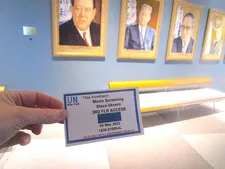 |
| VIP UN ticket for Slava Ukraini screening and discussion Photo: Anne-Katrin Titze |
All of that is in the southern city of Kherson, which was one of very few cities where the Russians, the only one by the way, the Russians took at the beginning of the war, 14 months ago. When I arrived, the Ukrainians had just liberated it, but there are still sleeper cells of Russian agents. Is this man one of them? My friends say yes. I’ve no proof. I leave it like this.
AKT: You are making a reference to Bitter Victory - are there filmmakers you particularly admire who captured something of war that you experienced?
BHL: Probably the Spanish Civil War. André Malraux’s [Espoir:] Sierra de Teruel [1938-39] is probably a masterpiece in this sort. Terre d’Espagne, The Spanish Earth [1937] by Joris Ivens with a voice-over spoken by Ernest Hemingway is a masterpiece. Contemporary, you have the film of the French war reporter of Le Monde, one of the best probably living reporters in the west, Rémy Ourdan. He made a film about the siege of Sarajevo, called The Siege [2016]. It’s probably one of the best things you can see today about war.
AKT: In the fifth chapter, Scorched Earth, you mention the Russian strategy being the same as Hitler’s. Again you give the specific date, March 19, 1945. It is so unfathomable that now, in the middle of Europe, “scorched earth” is again the plan in 2023! This is what we are dealing with.
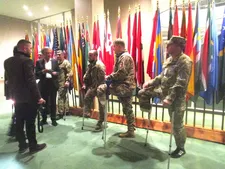 |
| Bernard-Henri Levy with Ukrainian soldiers at the United Nations Photo: Anne-Katrin Titze |
BHL: Yes, it’s clearly the strategy of Putin. The target is colonisation of Ukraine, is an imperialist target. But the method is the “scorched earth,” yes. It’s not an accident, it is a strategy. When the Russians destroy Mariupol, when they commit mass murder in Bucha, when they behead, decapitate soldiers in Bakhmut, it’s not an accident, it’s not committed by lost soldiers. It is a conscious strategy.
AKT: Which makes it the most terrifying, that this is a strategy. The film is open ended, of course, and we can wish for a happy ending. Will you go back?
BHL: If it seems necessary and if I am still able to get images which would not be available otherwise, I probably would, yes.
Read what Bernard-Henri Lévy had to say on a young girl and Alexandre Dumas, Babi Yar and the importance of providing the correct number of dead, and being in the trenches while filming Slava Ukraini.
Read what Bernard-Henri Lévy had to say on The Will To See, Ukraine and the French presidential election.








